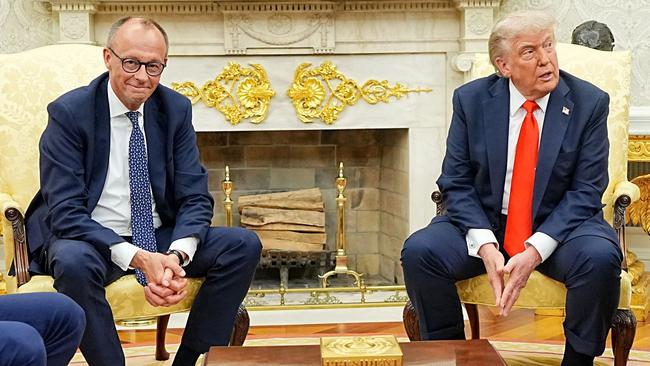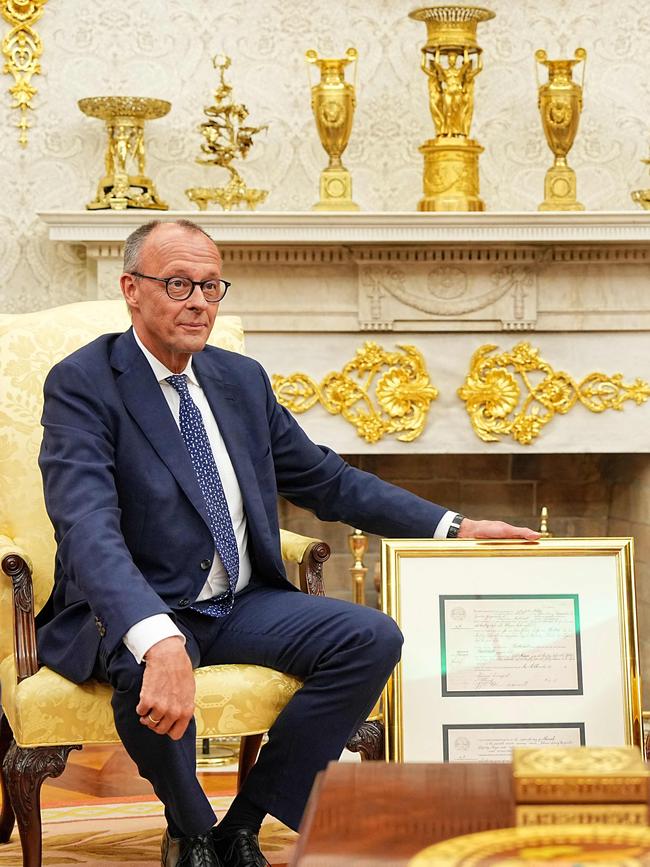Trump says Russia and Ukraine may need to ‘keep fighting’ before making peace
German Chancellor Friedrich Merz encouraged the president in Oval Office meeting to help end the war

President Trump said Russia and Ukraine might need to “keep fighting” before either side is ready for a ceasefire.
Speaking in the Oval Office on Thursday alongside German Chancellor Friedrich Merz, Trump said neither Moscow nor Kyiv were ready to make peace. He said it might be wiser to let the war continue before seriously pursuing diplomacy.
Trump said he delivered that message to Russian President Vladimir Putin on Wednesday in a phone call. Putin said in the call that he would soon launch a large attack on Ukraine in retaliation for Ukraine’s drone strike on Russian bombers, Trump said.
“They’re going to just keep fighting,” Trump said, using the analogy of children squabbling in a park or hockey players throwing fists before the skirmish is broken up. “Maybe you’re going to have to keep fighting, suffering a lot, because both sides are suffering.”
It was an acknowledgment that Trump’s sprint for a peace deal has failed. Trump said repeatedly during the 2024 presidential campaign that he could end the Russia-Ukraine war in a day. He has since claimed that he was speaking sarcastically. Now, four months into his presidency, Trump said he had resigned himself to more death and destruction.
“I’m for stopping killing, really, that’s what I’m for,” Trump said. “I want to see the killing stop.”
Trump suggested that he might reprimand both Russia and Ukraine if they don’t sign a peace deal by an undisclosed deadline he has in mind. That is a different position than Trump has taken in the past. He has repeatedly said he would make a decision on Russia’s willingness for a deal within two weeks — a deadline that has come and gone. Putin has shown no sign of wanting to end the war and continued to pound Ukrainian targets.
Merz, asked if he also saw the conflict as between two children, said Trump was the most important player in ending the war. “He is the key person in the world,” the chancellor said. “We are having the duty to do something now to stop it after 3½ years.”
Merz arrived on Thursday intent on keeping Trump invested in the fate of Europe. Merz is the latest in a string of European leaders to visit the White House in a campaign to cajole the American president into backing new sanctions on Russia, striking a trade deal with the European Union and reaffirming the US security commitment to the region.
The straight-laced chancellor has none of Trump’s backslapping joviality or biting humour. But the two share some things in common: Both are former businessmen who aren’t known for excessive patience. Trump complimented Merz on his impeccable English.
“It’s an achievement,” Trump said.

Trump’s showdowns with Ukrainian President Volodymyr Zelensky and South African President Cyril Ramaphosa have shown how unpredictable visits to the Oval Office can be with Trump. But Merz’s visit was a friendly affair, with the leaders praising each other and vowing to work together on trade.
Germany’s export-dependent economy stands to lose more than most in Europe from a protracted trade war with the US, its largest trade partner. Even though Trump has suspended his threatened 50 per cent tariffs on European exports until July 9, Germany’s auto industry is already subject to 25 per cent levies.
Merz had hoped to persuade Trump that Russia won’t negotiate peace unless it faces additional sanctions from Europe and the US Sen. Lindsey Graham toured Europe recently to gather support for a bill that would impose 500 per cent tariffs on countries that purchase Russian oil. Merz met Graham in Berlin on Monday and supports the initiative.
Merz also hoped to persuade Trump that Europeans are spending real money on defence and rapidly rebuilding their long-neglected militaries. In exchange, they hope the US will reaffirm its commitment to the military alliance. Trump said Thursday he supported America’s significant military presence in Germany.
Despite having the second-largest military budget in NATO, years of underspending have left Germany with depleted defences. Under Merz, Berlin is ramping up procurement and has pledged to raise military spending from 2.1 per cent of gross domestic product last year to 3.5 per cent, with another 1.5 per cent of GDP to be spent on defence-related infrastructure.
Wall Street Journal





To join the conversation, please log in. Don't have an account? Register
Join the conversation, you are commenting as Logout